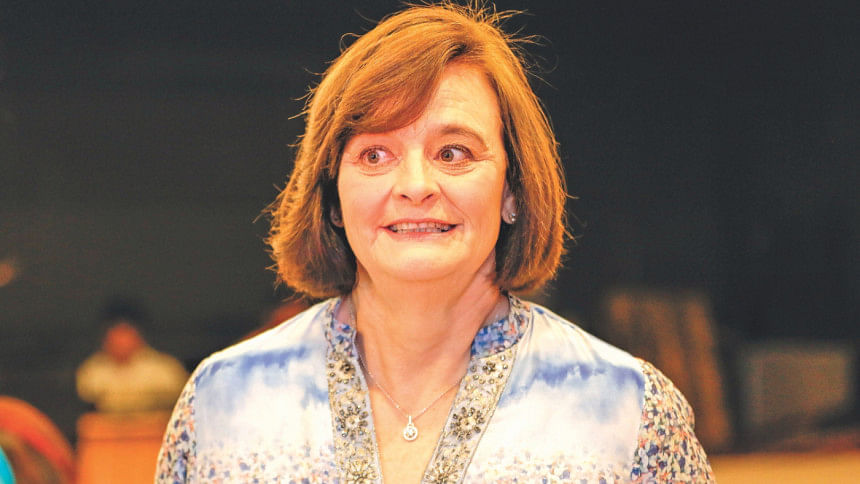Creating more opportunities: face to face with Cherie Blair

Cherie Blair, a British barrister, lecturer and writer, is also the Chancellor of the very first (and probably the only) Liberal Arts school / university in Bangladesh, Asian University for Women (AUW), located in Chattogram. During their recent graduation ceremony, Cherie Blair spent the day talking to students and also visiting the Rohingya camps in Cox's Bazaar. She took out some time to talk to The Daily Star about fellowships at the AUW, her foundation working for the emancipation of women, and challenges that women face all over the world.
Could you shed some light on the Cherie Blair Fellowship which had begun in 2010 at the AUW?
The fellowship was established back then to mark the time when I had become a chancellor. In 2008, I had become a patron and in 2010, I became the first chancellor. In 2010 around 10 fellows were selected. I think now they select only one student. I do meet them sometimes. They email me with questions and lots of opinions. They have very strong views! So, yes I am in contact with them all the time!
There is a scholarship for young people working in the garment factories at AUW. Why do you think more factories in Bangladesh should look into this scholarship for their workers?
It is a very interesting programme. If we are talking about finding the lost talent that is not allowed to come out because of circumstances like financial insolvency or conservative social norms, this scholarship is actually helping women get the opportunity that they would otherwise lose out on. The genius of the idea is that while the young worker is studying at AUW, the salary is still being paid. You see, many girls do not go for higher studies because their families depended on their incomes. This way, the scholarship also enables families to survive better. This will also help not only the garment factories who are paying the salaries, but also the wider Bangladesh, where talents will be recognised and nurtured.
What is the aim of the Cherie Blair Foundation for Women?
The foundation does not work in the UK, we work mainly in the lower middle income countries. The aim is to help women set up, expand and grow their businesses as entrepreneurs, so that they can support themselves, generate the economy, and enable their voices to be heard. In a nutshell, live the lives they want to live. We have a number of programmes. One programme that we would like to highlight is a global mentorship platform, which started in 2010. After the first pilot that we did with women who wanted to be entrepreneurs, it has been open for women in Bangladesh as well. We are open in 100 countries. The programme is available on the web, which many have access to, through our local partners.
What are the common challenges that you feel women go through in different countries?
Each individual is different and have different challenges. But there are some common themes between the women that I come across, all around the world. For instance, a basic fundamental thought is that women are not worth as much as men. Secondly, it is the idea that women lack the ability to control their own lives, hence cannot make their own choices. This is why I am so passionate about economic empowerment. You cannot walk away from an abusive relationship, you cannot insist for your children to go to school, if you do not have the means to be able to pay for it. Economic independence is important, and when women have this independence as they should, it gives them the confidence to find their voices.
Some are now slowly moving towards trade schools, as opposed to the conventional line of education. What would be your thoughts on that?
It is interesting how modern technology, the internet etc. can help us to reach the mass, in order to enable more women to get access to knowledge, which was not possible in the past. In my own foundation, we use technology for this purpose. For example, we have a project running in Indonesia, Vietnam and Mexico. It's called HerVenture – it is a free app that assists in two ways – first, if you want to start a business; second, if you already have a business. The project provides a curriculum of business training skills in 6-8 minute video segments. It is like an online course designed for women who would want to start, say a hairdressing salon, but does not have the know-how. Designed as byte sized pieces, the project is proving be very successful. We are hoping to bring this to Bangladesh. We would offer it in the local languages of course. I would like to team up with one of the mobile phone operators and provide it here. So watch this space for more!

 For all latest news, follow The Daily Star's Google News channel.
For all latest news, follow The Daily Star's Google News channel. 



Comments